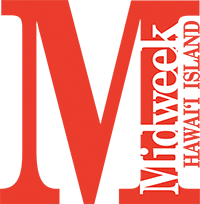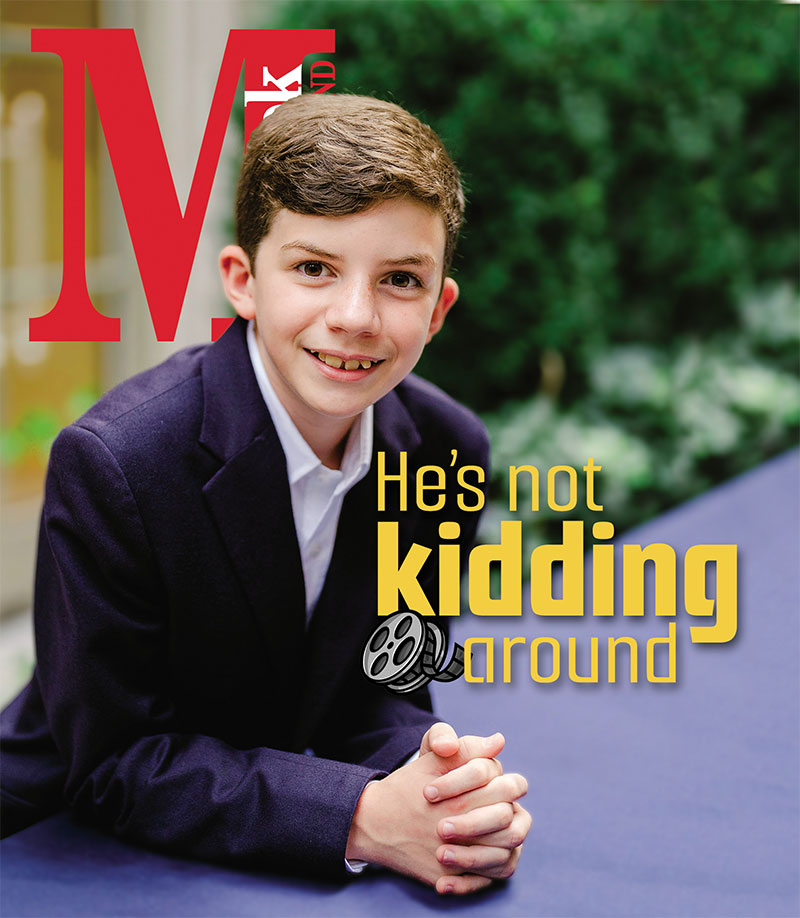He’s Not Kidding Around
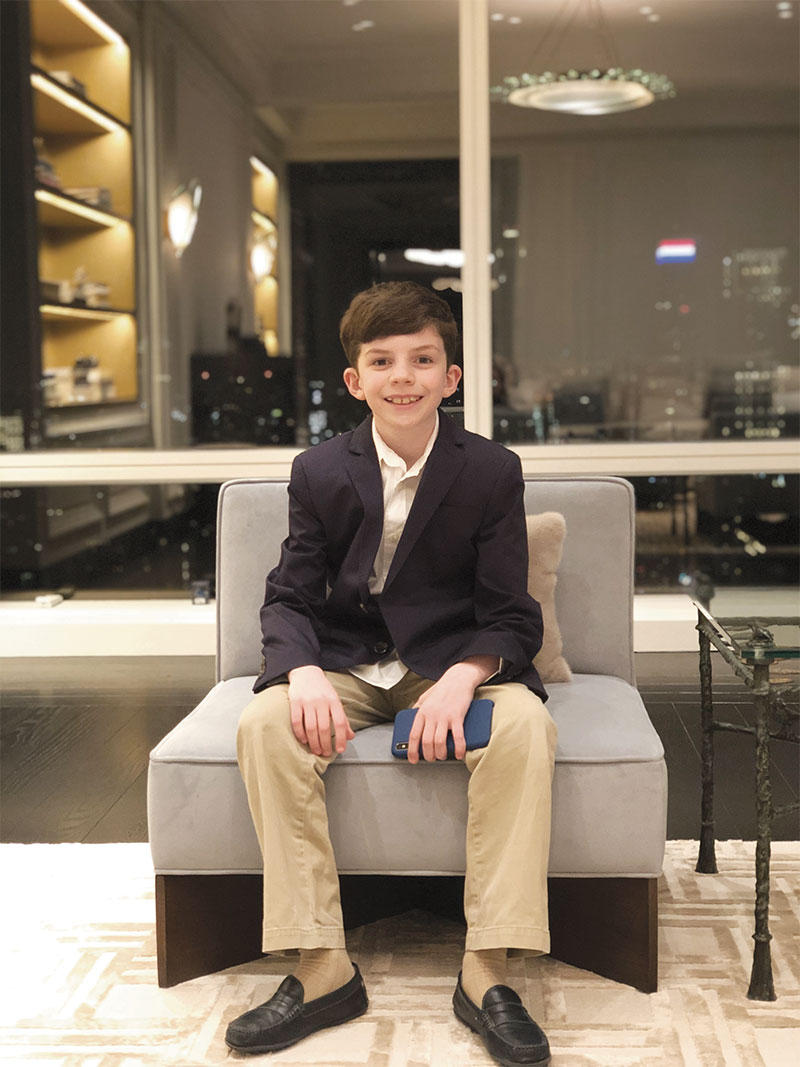
How serious is 14-year-old Steven Hoffen about growing peace in Israel? So serious that the young filmmaker and hydroponics fan has produced an award-winning documentary.
In many ways, Steven Hoffen is a typical teenager who does typical things in his free time like swim in pools and play board games such as Monopoly and backgammon.
But he’s also noticeably different from most his age in at least one pastime. At 14, Steven is not only a filmmaker, but an award-winning one. His documentary short Growing Peace in the Middle East has already claimed its share of environmental and humanitarian impact awards at over 70 film festivals around the globe, including the esteemed London Independent and International Human Rights Arts film festivals. Back in February, the documentary was even featured at University of Hawai‘i KIDS FIRST! Film Festival.
Despite all the fanfare he’s been receiving, the teenager is rather sheepish when it comes to others heaping praise on him.
“As of right now, I’m still a little bit shy talking about this in front of my friends,” admits the New York resident, whose family had a home on the Big Island until recently. “A couple of my friends know about (the documentary’s success) … I’m not sure how they know.”
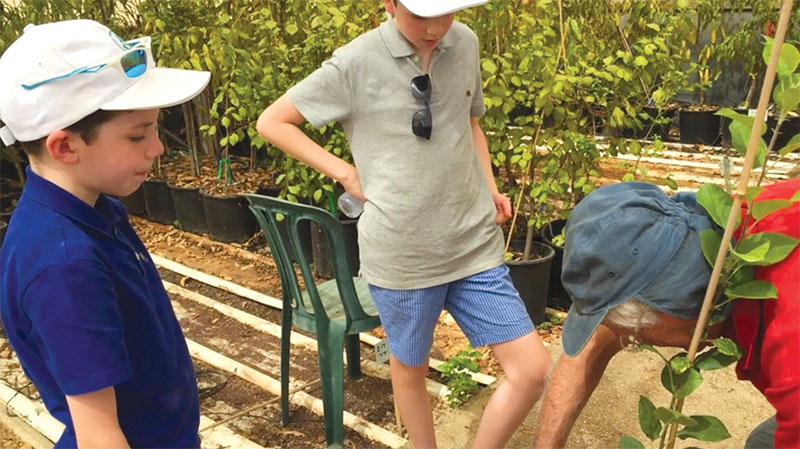
A visit to Israel three summers ago inspired Steven Hoffen, at left, to create a short documentary about a nonprofit made up of women, including Hanan and Hadas, and how hydroponics is helping them to grow peace in the region.
While the intense spotlight leaves him a bit uncomfortable, Steven hasn’t been bashful about shedding light on an initiative that’s based in a troubled part of the world: Israel. That initiative concerns the nonprofit organization Sindyanna of Galilee and forms the basis of his much acclaimed, 17-minute-long documentary.
Sindyanna of Galilee is staffed by Jewish and Arab women who share a similar vision of working together in peaceful coexistence. Many of these women previously labored in factories in the Holy Land, according to the young filmmaker, but were left unemployed after their jobs were moved to other parts of the world.
Rather than give up on their futures, however, the women organized and launched a slew of projects to keep them active and productive. Among their collaborative efforts has been growing produce in hydroponic gardens, a particularly effective system in helping to combat the country’s less-than-ideal climate conditions because it requires no soil and very little water.
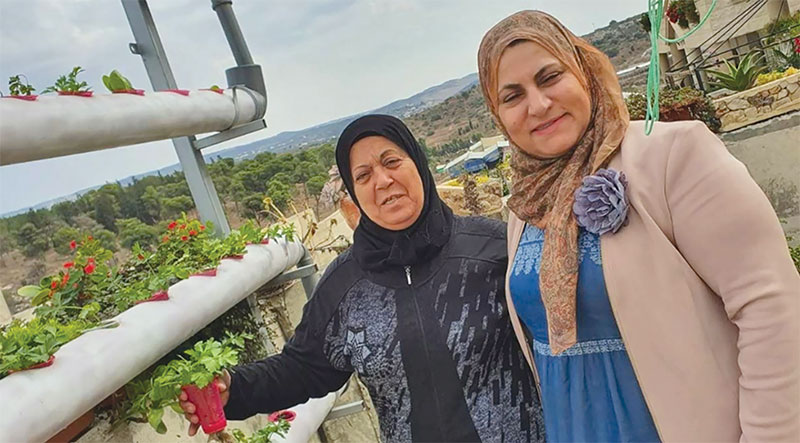
A visit to Israel three summers ago inspired Steven Hoffen, at left, to create a short documentary about a nonprofit made up of women, including Hanan and Hadas, and how hydroponics is helping them to grow peace in the region.
“A lot of experts think that hydroponics is kind of a job for the future and a method of farming that’s looking toward the future, so this was Sindyanna’s way of catching Arab and Jewish women up in the world of technology and making sure they’re not left behind,” explains Steven.
“One of the main reasons they use hydroponics in the homes of these women is because they don’t have a lot of space in the area where they live,” he continues. “In normal farming, you can only really do one layer of planting. But in hydroponics, you can stack these layers and have many hydroponic systems operating on top of each other at the same time.”
Since the documentary came out, more women have joined the Sindyanna project and begun installing hydroponic systems in their homes. Steven is particularly proud of playing a role in the growth of the organization.
“I’m really happy for that,” he says excitedly. “The women get to grow their own food and it’s something for them to do in their spare time. Whatever is left that they don’t need, they’re actually able to sell that for profit.”
The genesis of the project first took root three summers ago when Steven and his older brother visited the Sindyanna farm. Almost immediately, Steven was struck by the willingness of the nonprofit’s cofounders — a Jewish woman named Hadas, and an Arab woman named Hanan — to bridge cultural divides in an attempt to promote “business for peace.”
“What stood out to me was the two people who were touring me around kind of looked like two great friends who had known each other for a long time,” recalls Steven. “It didn’t look like there was any tension between them. Just being able to see a Jewish woman cooperating with an Arab woman gave me a sneak peek into what Sindyanna did as a whole, and that’s what got me interested.
“It’s why I created the documentary: to show people who think that Jews and Arabs will always be at war that no, they can live in peace. Sindyanna is perfect example of it,” he continues. “All it really takes is for two people to take a leap of faith, to meet the other community and see what they’re actually like.”
Aside from providing the film’s narration, Steven was responsible for writing its script, conducting its interviews and editing everything down to its final version.
“I really enjoy writing. For some reason, it was fun just to write my own script,” says the eighth-grader who attends one of the country’s finest private college-preparatory institutions, Riverdale Country School, in Manhattan. “In school, you have to write all these essays and paragraphs according a certain topic. For me, I could decide how I wanted my video to go. Obviously, it would have to be informative, but I could decide how I wanted to organize the entire thing. It gave me a sense of freedom.”
Despite the numerous film festivals the documentary has already been a part of, Steven says he’s not done yet.
“I’m still submitting the last wave (of entries) to other film festivals,” he notes. “After that, I’m probably going to release the film on my website so that everybody will be able to see it.”
Neither is he finished with film-making in general. He’s currently working on a short video series about the plights of Eritrean and Sudanese asylum seekers fleeing to Israel. To solve their food insecurity problem, Steven launched a fundraiser through his nonprofit, Growing Peace Inc., to have a hydroponics system installed at a food bank.
“This food bank is kind of special to me because it opened up at the beginning COVID and it primarily serves these asylum seekers. Because they aren’t citizens, they don’t have the same rights and they struggle to obtain food,” he explains. “So, we built this hydroponic system to provide them with nutritious food.”
His interests in hydroponics has also led him to begin installing systems in New York, as well.
“I couldn’t go to Israel to see the hydroponics system because it was in the middle of COVID, but I am going there this summer to finally see it. I was really hoping in New York that I would be able to get some hands-on experience, so that’s why I’ve been doing all these projects here.”
As for what his future holds, the youngster would only say that continued life behind a camera is definitely in the cards.
“I’m still kid, so I’m not exactly sure what I’ll be doing after college,” he says. “But filmmaking is definitely an option.”
To follow Steven’s projects, visit growingpeaceinc.org.
